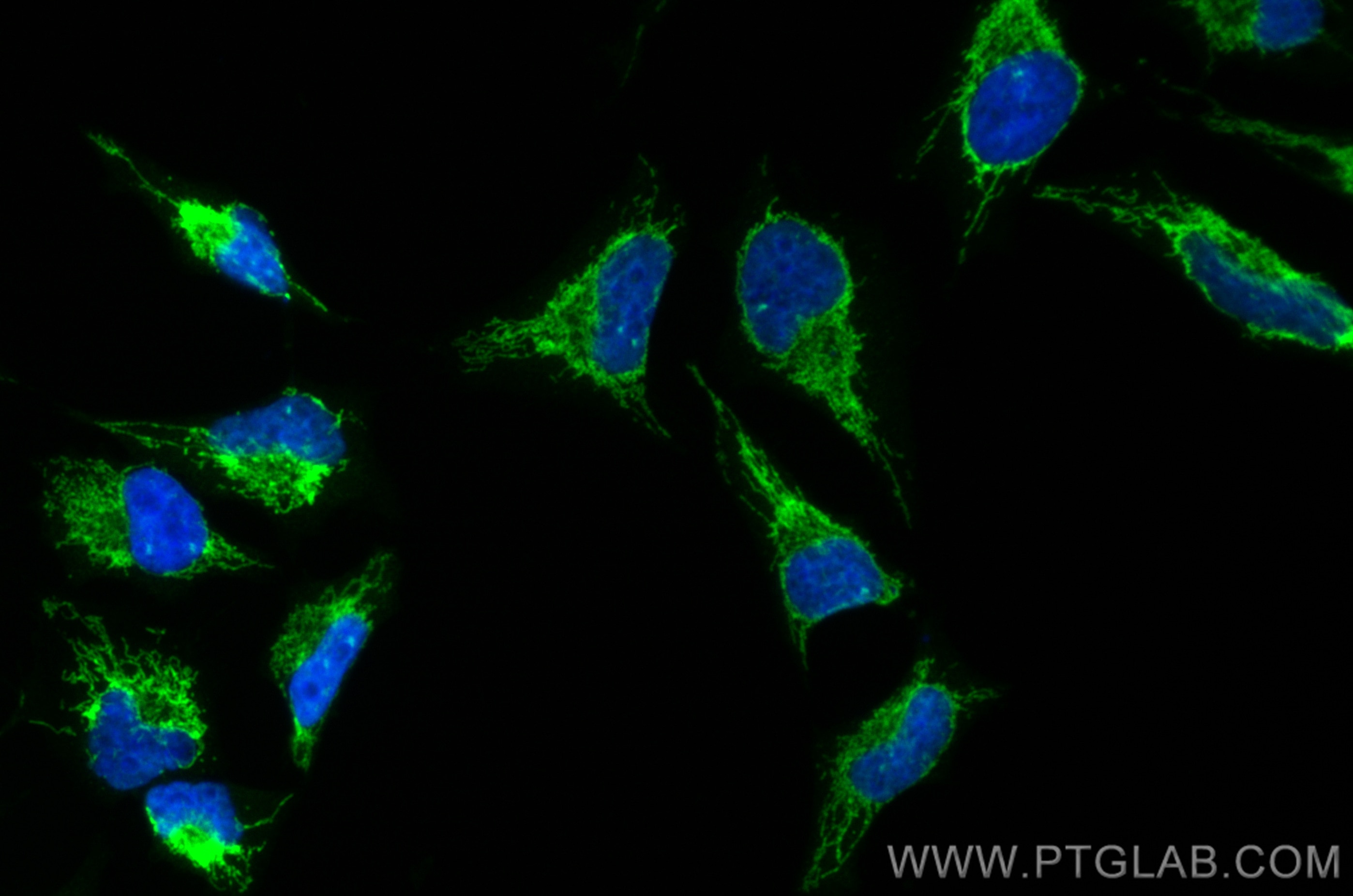Validation Data Gallery
Tested Applications
| Positive IF/ICC detected in | HeLa cells |
Recommended dilution
| Application | Dilution |
|---|---|
| Immunofluorescence (IF)/ICC | IF/ICC : 1:50-1:500 |
| It is recommended that this reagent should be titrated in each testing system to obtain optimal results. | |
| Sample-dependent, Check data in validation data gallery. | |
Product Information
CL488-12175 targets OXCT1 in IF/ICC applications and shows reactivity with human, mouse, rat samples.
| Tested Reactivity | human, mouse, rat |
| Host / Isotype | Rabbit / IgG |
| Class | Polyclonal |
| Type | Antibody |
| Immunogen |
CatNo: Ag2818 Product name: Recombinant human SCOT protein Source: e coli.-derived, PGEX-4T Tag: GST Domain: 151-520 aa of BC009001 Sequence: GVPAFYTPTGYGTLVQEGGSPIKYNKDGSVAIASKPREVREFNGQHFILEEAITGDFALVKAWKADRAGNVIFRKSARNFNLPMCKAAETTVVEVEEIVDIGAFAPEDIHIPQIYVHRLIKGEKYEKRIERLSIRKEGDGEAKSAKPGDDVRERIIKRAALEFEDGMYANLGIGIPLLASNFISPNITVHLQSENGVLGLGPYPRQHEADADLINAGKETVTILPGASFFSSDESFAMIRGGHVDLTMLGAMQVSKYGDLANWMIPGKMVKGMGGAMDLVSSAKTKVVVTMEHSAKGNAHKIMEKCTLPLTGKQCVNRIITEKAVFDVDKKKGLTLIELWEGLTVDDVQKSTGCDFAVSPKLMPMQQIAN 相同性解析による交差性が予測される生物種 |
| Full Name | 3-oxoacid CoA transferase 1 |
| Calculated molecular weight | 520 aa, 56 kDa |
| Observed molecular weight | 56 kDa |
| GenBank accession number | BC009001 |
| Gene Symbol | OXCT1 |
| Gene ID (NCBI) | 5019 |
| RRID | AB_3083919 |
| Conjugate | CoraLite® Plus 488 Fluorescent Dye |
| Excitation/Emission maxima wavelengths | 493 nm / 522 nm |
| 激发激光 | Blue laser (488 nm) |
| Form | |
| Form | Liquid |
| Purification Method | Antigen affinity purification |
| UNIPROT ID | P55809 |
| Storage Buffer | PBS with 50% glycerol, 0.05% Proclin300, 0.5% BSA{{ptg:BufferTemp}}7.3 |
| Storage Conditions | Store at -20°C. Avoid exposure to light. Stable for one year after shipment. Aliquoting is unnecessary for -20oC storage. |
Background Information
3-oxoacid-CoA transferase 1 (OXCT1), encoded by nuclear gene, is a mitochondrial CoA transferase required for ketone body degradation. It catalyzes the transfer of CoA from succinyl-CoA to acetoacetate, generating acetoacetyl-CoA. OXCT1 is expressed in brain, heart, and skeletal muscle, but not in liver. This antibody specifically recognizes endogenous OXCT1. (21209089)
Protocols
| Product Specific Protocols | |
|---|---|
| IF protocol for CL Plus 488 OXCT1 antibody CL488-12175 | Download protocol |
| Standard Protocols | |
|---|---|
| Click here to view our Standard Protocols |

